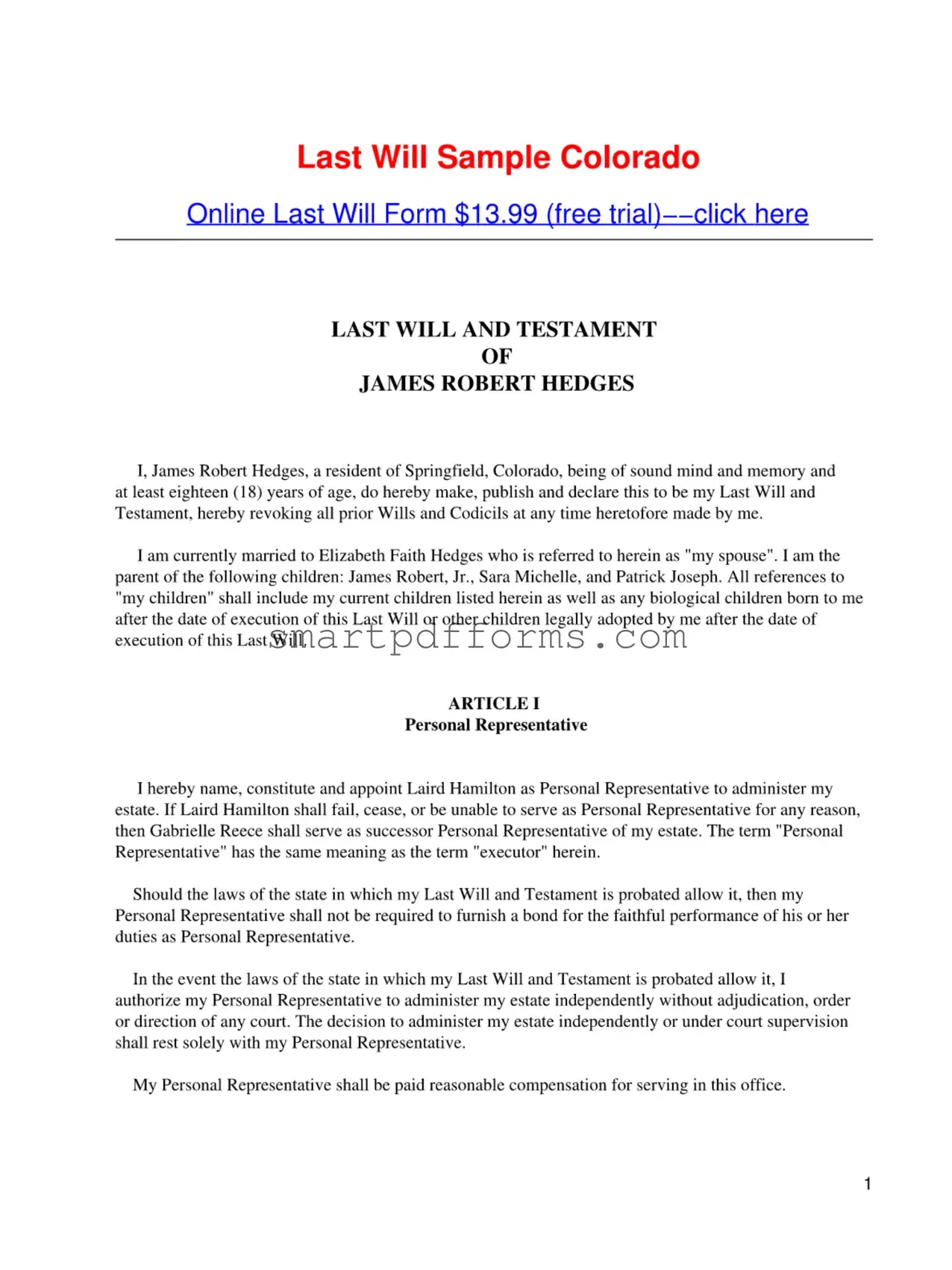Blank Colorado Will PDF Template
The Colorado Will Form, exemplified through the Last Will and Testament of James Robert Hedges of Springfield, Colorado, outlines a comprehensive and structured approach to estate planning within the state. This document, intended for persons of sound mind and at least eighteen years of age, serves not only to designate the distribution of the testator's estate but also to appoint a personal representative, manage debts and expenses, and make specific provisions for both the testator's burial and the guardianship of minor children. Highlights of this will include the appointment of Laird Hamilton as the Personal Representative with Gabrielle Reece as the successor, should the primary appointment be unable to serve. It underscores the discretionary powers granted to the Personal Representative in the absence of court orders, especially regarding estate administration, debt settlement, and burial arrangements. The document does not specify charitable donations but delineates the distribution of personal effects and the residuary estate among the surviving spouse and children, with specific statutes ensuring the care and financial security of the testator's offspring. Furthermore, it vests the Personal Representative with broad powers in managing estate assets, thereby encapsulating a detailed and forward-looking perspective on posthumous estate management.
Preview - Colorado Will Form
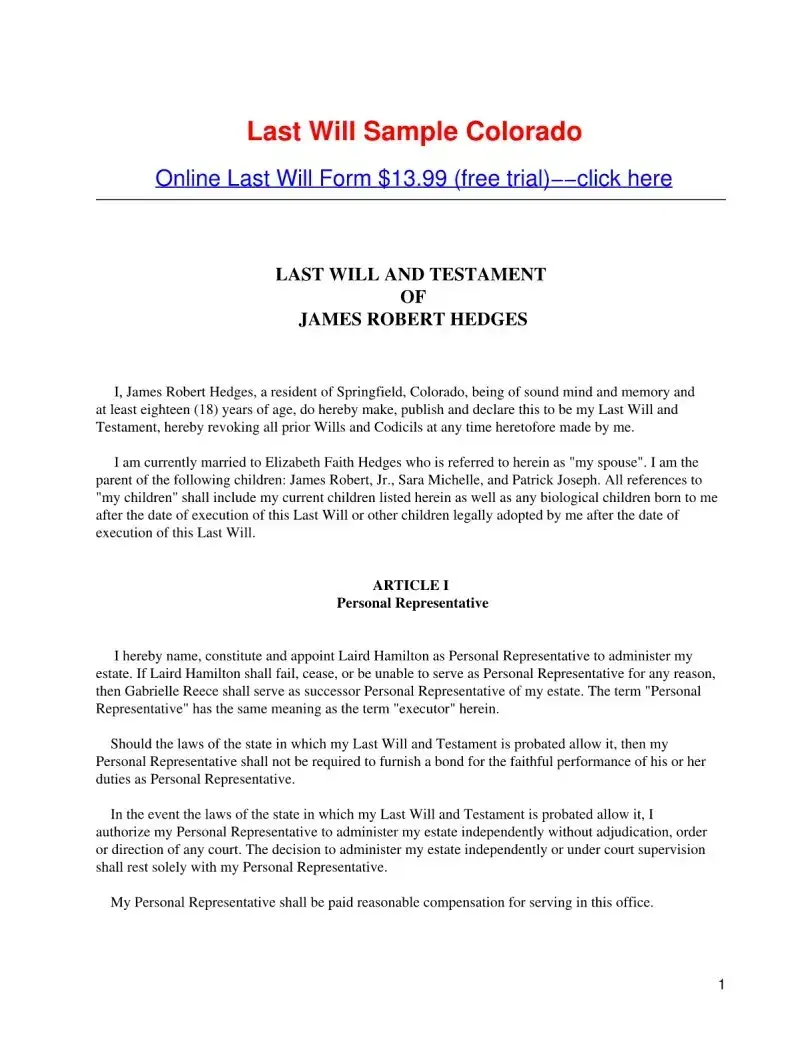
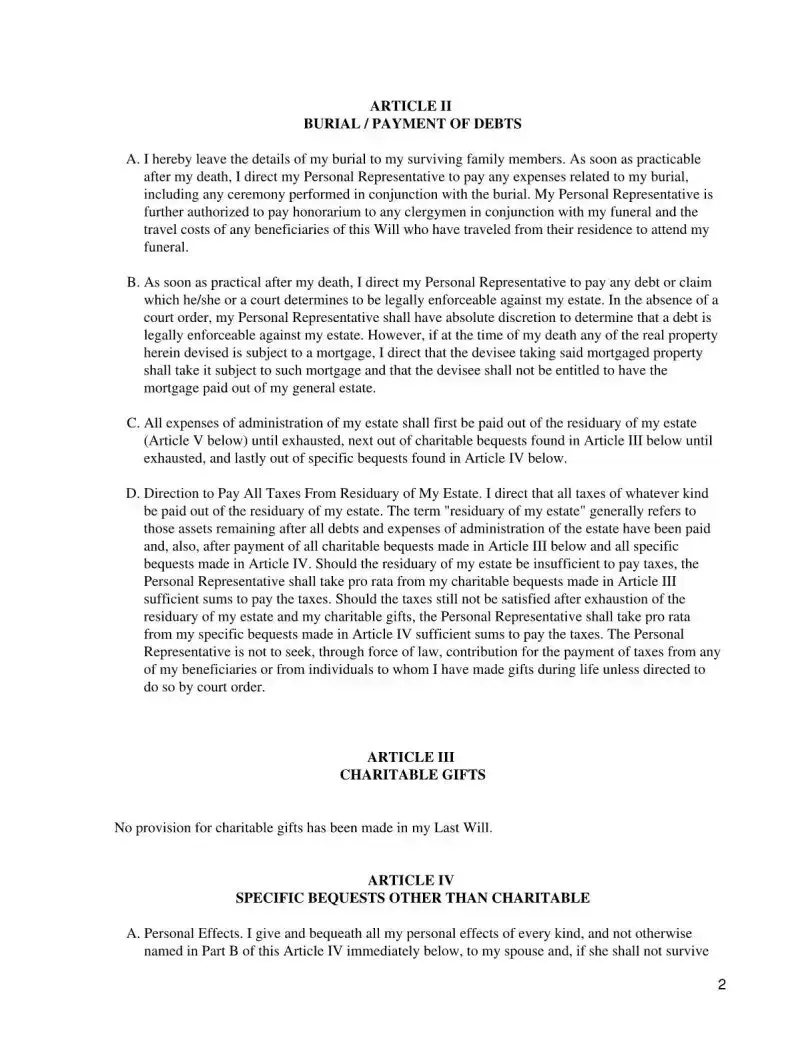
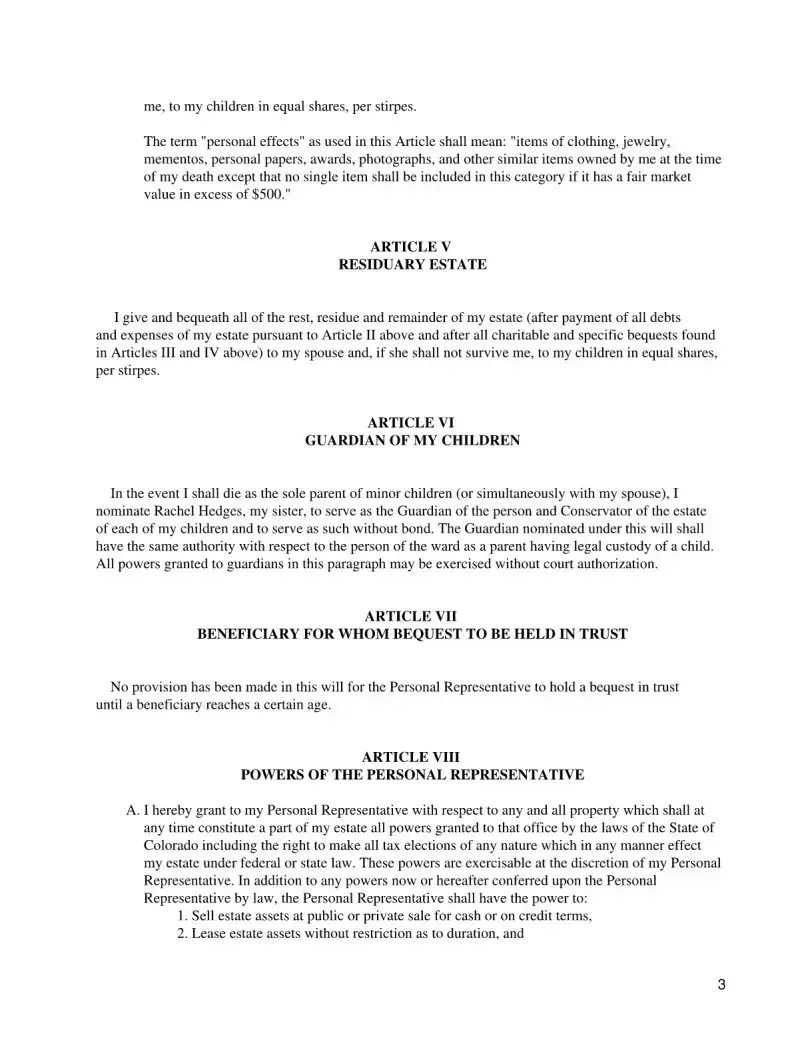
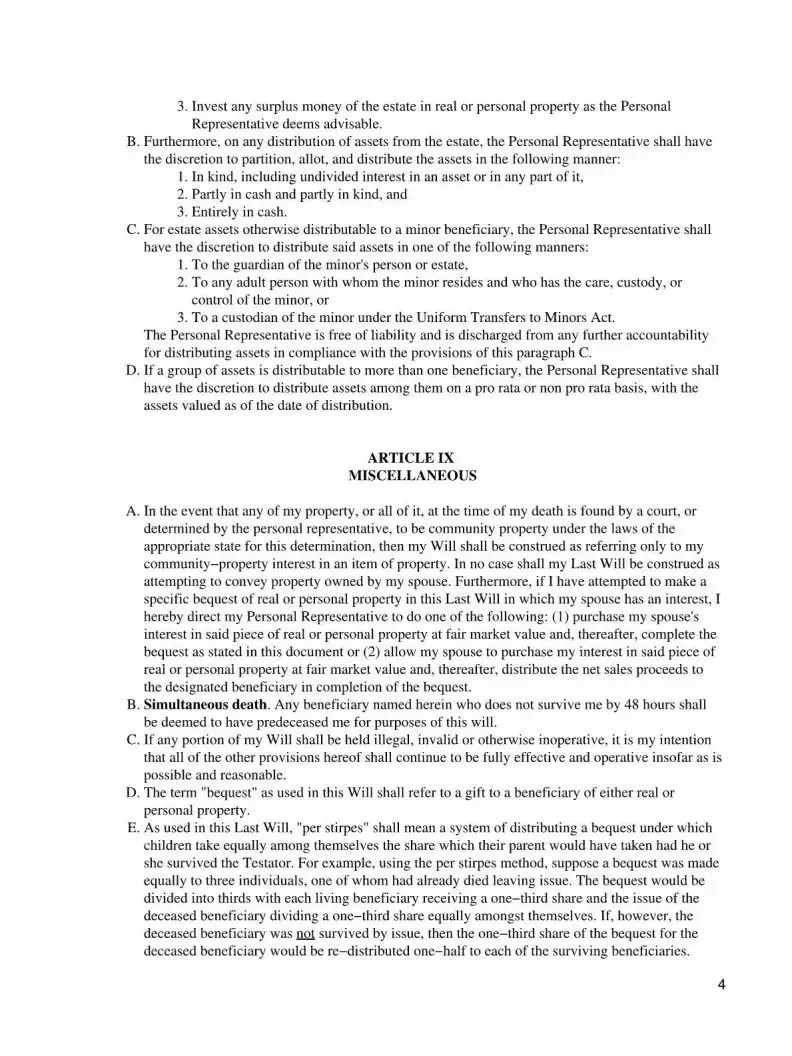

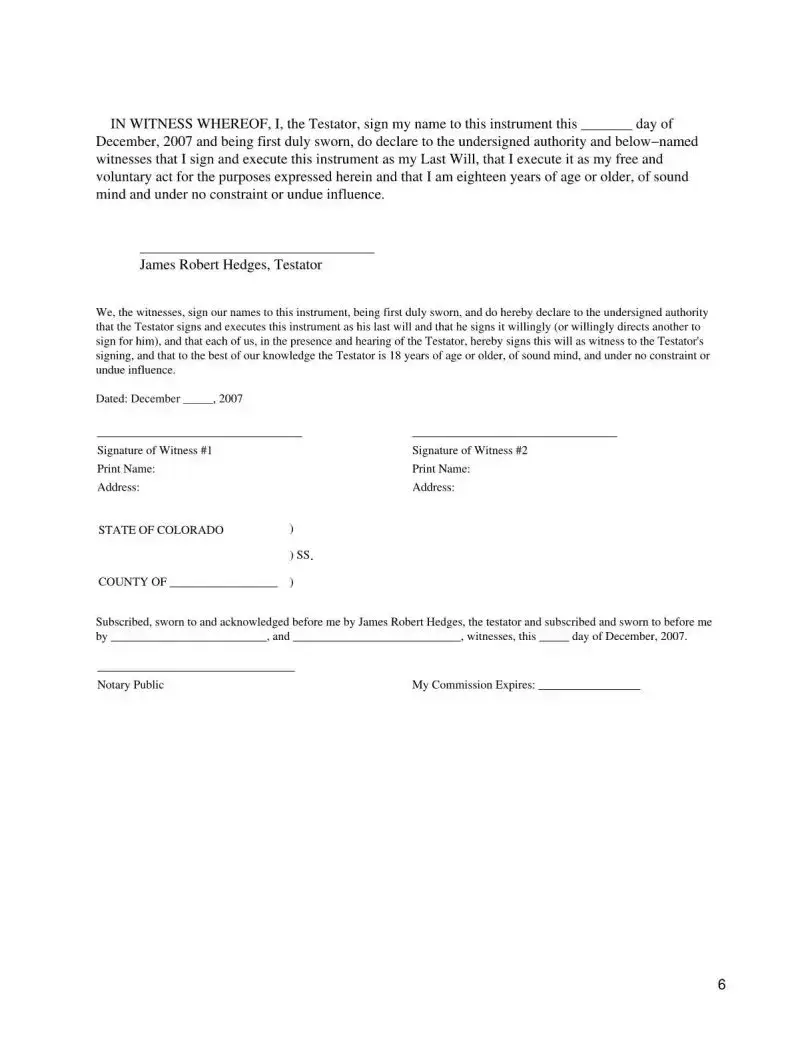
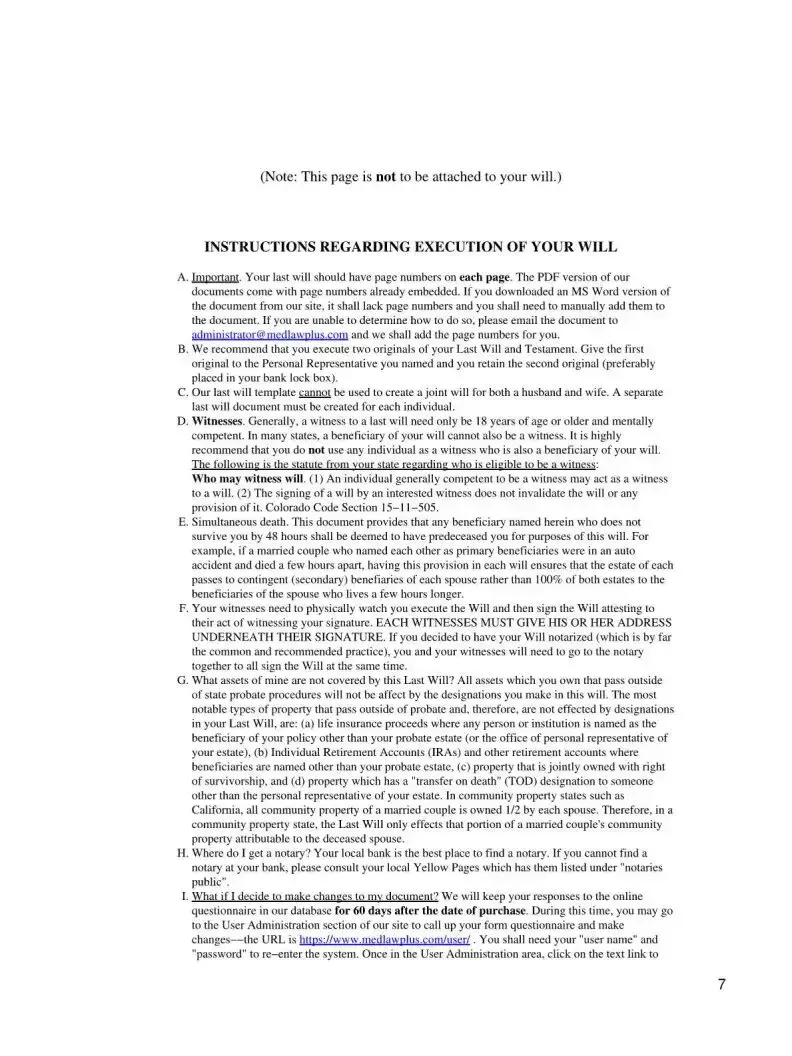

Form Data
| Fact Name | Detail |
|---|---|
| Age Requirement | The individual creating the Will (testator) must be at least eighteen (18) years of age. |
| Sound Mind Declaration | The testator declares themselves to be of sound mind and memory at the time of making the Will. |
| Revocation of Previous Wills | This Will revokes all prior Wills and Codicils previously made by the testator. |
| Personal Representative Appointment | A Personal Representative is named to administer the estate, with a successor named should the initial choice be unable to serve. |
| Governing Law | The Will grants the Personal Representative powers as conferred by the laws of the State of Colorado. |
Instructions on Utilizing Colorado Will
Filling out a Colorado Will form is a straightforward process but requires careful attention to detail. The goal is to ensure your assets are distributed according to your wishes after your passing. This involves naming a personal representative, specifying beneficiaries, and detailing the distribution of your estate, among other elements. Follow these steps to accurately complete the form:
- Start by clearly writing your full legal name at the beginning, establishing yourself as the creator of the Last Will and Testament.
- Confirm your residency in Colorado and your legal age (at least 18 years old) to verify you are legally allowed to create a will.
- Identify your marital status and name your spouse if applicable, referring to them as "my spouse" throughout the document.
- List the names of your children, specifying that "my children" includes both biological and legally adopted children, even those born or adopted after the will's creation.
- Appoint a Personal Representative (executor) to handle your estate, naming a successor in case your first choice is unable or unwilling to serve. Specify no bond is required for them if permitted by state laws.
- Direct how you wish your burial to be handled and authorize the Personal Representative to pay for burial expenses, any debts, and administration expenses of your estate.
- Indicate that all taxes should be paid from the residuary of your estate and detail how to proceed if funds are insufficient.
- If you wish to make charitable gifts, specify this. If not, acknowledge that no provision for charitable gifts has been made.
- Bequeath your personal effects and any specific bequests to your named beneficiaries, clearly defining what constitutes "personal effects."
- Detail the distribution of the residuary of your estate to your spouse or, if they do not survive you, to your children in equal shares, per stirpes.
- Nominate a guardian for any minor children, should you die as the sole parent or simultaneously with your spouse.
- Note that there are no provisions made in the will for bequests to be held in trust for any beneficiary.
- Outline the powers you grant to your Personal Representative, including selling estate assets, leasing assets, and making tax elections, in accordance with Colorado laws.
- Finally, ensure the form is signed and dated in the presence of witnesses who meet Colorado's legal requirements, making the document legally binding.
Each step is vital to creating a clear and legally enforceable will that honors your wishes regarding the distribution of your estate. Remember to review the completed form thoroughly before signing to confirm all information is correct and reflects your intentions.
Obtain Answers on Colorado Will
What is the purpose of the "Last Will and Testament" form in Colorado?
The "Last Will and Testament" form in Colorado is designed to specify how an individual's property and responsibilities should be handled after their death. It allows the person creating the will, known as the testator (in the provided document, James Robert Hedges), to name who will inherit their belongings, appoint a personal representative (also called an executor) to manage the estate, specify arrangements for debts and taxes, and make provisions for the care of minor children. This document is crucial for ensuring that the testator’s wishes are followed regarding their estate.
Who can act as a Personal Representative according to the sample will?
In the provided sample will, James has appointed Laird Hamilton as the initial Personal Representative to administer his estate. If Laird Hamilton is unable or unwilling to serve, Gabrielle Reece is named as the successor Personal Representative. The will specifies that this role is synonymous with an executor and outlines that the appointed individual has the authority to manage the estate's affairs, such as paying debts and distributing assets, potentially without needing to post a bond or operate under court supervision, depending on Colorado law.
How are debts and taxes to be handled according to the will?
The will directs the Personal Representative to pay burial expenses, any legally enforceable debts, and taxes from the estate's assets. Initially, these obligations are to be settled using the residuary of the estate (what remains after specific bequests are distributed). If the residuary fund is insufficient, the will instructs the personal representative to use assets designated for charitable bequests, and if needed, from specific bequests, to satisfy these obligations. The direction is clear that handling debts and taxes is a priority and outlines a specific order for which assets are to be used.
What provisions are made for the testator's children?
The will explicitly includes all of James' current children and any children born to him or legally adopted after the will's execution under "my children." In terms of inheritance, if James' spouse does not survive him, his estate is to be divided equally among his children. The document also addresses the care of minor children if James dies as the sole parent or simultaneously with his spouse, nominating his sister, Rachel Hedges, as the guardian of his minor children without requiring her to post a bond. This ensures that the children's welfare is considered and provided for according to James' wishes.
Common mistakes
When people fill out the Colorado Will form, several common mistakes can complicate the administration of their estate. Identifying and avoiding these errors can ensure that their final wishes are honored and that the process is as smooth as possible for their loved ones. Below are eight mistakes often made on the Colorado Will form:
- Not updating the Will after significant life changes: Failing to update the Will after major events such as marriage, divorce, the birth of a child, or the death of a named beneficiary or executor can lead to outcomes that don't reflect the current wishes of the individual.
- Choosing an inappropriate Personal Representative: Selecting someone who is not well-organized, lacks financial acumen, or lives far away can impede the efficient administration of the estate.
- Omitting alternative beneficiaries: Not naming alternate beneficiaries in case the primary beneficiaries predecease the individual may result in assets being distributed in a manner not intended by the will maker.
- Vague or incomplete descriptions of bequests: Not clearly identifying property or beneficiaries can lead to confusion, disputes among potential heirs, and possibly the involvement of the court to interpret the Will’s intentions.
- Overlooking the inclusion of a residuary clause: Neglecting to include a residuary clause, which addresses the remainder of the estate after specific gifts are made, can result in parts of the estate passing under state intestacy laws rather than according to the individual's wishes.
- Assuming all assets can be distributed through the Will: Not recognizing that certain assets, such as those with designated beneficiaries (e.g., life insurance, retirement accounts) or those held in joint tenancy, pass outside of the Will can lead to inaccurate assumptions about the estate's distribution.
- Not specifying arrangements for digital assets: Failing to provide access information and instructions for digital assets such as social media accounts, online banking, and email accounts can lead to complications for the Personal Representative managing the estate.
- Attempting to address matters not allowed under Colorado law: Including instructions that conflict with Colorado law, such as imposing conditions on marriage or religion for beneficiaries, can render parts of the Will invalid or unenforceable.
By steering clear of these mistakes, individuals can create a Will that effectively communicates their wishes and facilitates a smoother transition for their beneficiaries.
Documents used along the form
When preparing a will in Colorado, it’s important to consider that this document is just one piece of a comprehensive estate plan. A well-structured estate plan often includes several other documents that work in conjunction with a will to ensure your wishes are fully realized and that your loved ones are taken care of according to your desires. Below is a list of other forms and documents commonly used alongside the Colorado Will form.
- Durable Power of Attorney: This document allows you to appoint someone to manage your financial affairs if you become incapacitated.
- Medical Power of Attorney: Also known as a healthcare proxy, this gives someone you trust the authority to make medical decisions on your behalf if you are unable to do so.
- Living Will: This outlines your wishes regarding life-sustaining medical treatments if you become terminally ill or permanently unconscious.
- Designation of Beneficiary for Bank Accounts (POD): A payable on death designation lets you name beneficiaries for your bank accounts, allowing the funds to bypass probate and go directly to the named individuals upon your death.
- Designation of Beneficiary for Non-Retirement Investment and Brokerage Accounts (TOD): Similar to a POD account, a transfer on death designation for non-retirement investment accounts ensures these assets transfer directly to your designated beneficiaries.
- Beneficiary Deeds for Real Estate: This allows you to name a beneficiary for your real estate, so the property can transfer to them upon your death without going through probate.
- Letter of Intent for Personal Possessions: Although not legally binding in all cases, a letter of intent can provide guidance to your loved ones about the distribution of personal items that may not be explicitly covered in your will.
- Trust Documents: Depending on your needs, setting up a trust might be beneficial for managing your estate's distribution. Trusts can help avoid probate, minimize estate taxes, and provide structured support to beneficiaries.
Each of these documents plays a vital role in ensuring that all aspects of your personal and financial life are taken care of according to your specific wishes. Together, they form a protective web for your assets and health decisions, providing peace of mind to you and your loved ones. Given the nuances of estate law and the importance of these decisions, consulting with a legal professional specializing in estate planning in Colorado is strongly recommended to ensure your estate plan is comprehensive, legally sound, and tailored to your unique situation.
Similar forms
A Living Will closely aligns with the Colorado Will form due to its provisions regarding personal decisions, such as burial wishes and health care preferences if incapacitated. Both documents empower someone to make critical decisions adhering to the wishes of the document's creator.
A Trust has similarities with the Colorado Will form, especially in terms of asset distribution. While a Will becomes effective after death, both documents outline specific instructions for managing and distributing assets to beneficiaries.
A Durable Power of Attorney (POA) shares the concept of appointing someone to act on your behalf, akin to naming a Personal Representative in a Will. POAs typically cover financial or health-care decisions during one's lifetime, showing parallel in responsibility delegation.
A Health Care Proxy is another document similar to portions of the Colorado Will form, specifically appointing someone to make medical decisions if the individual is unable. Although typically active during one’s lifetime, it shares the essence of entrusting important decisions to another.
A Beneficiary Designation Form, often associated with retirement accounts or life insurance policies, resembles the Will in specifying who will receive assets. Both documents help ensure assets pass to the chosen individuals or entities.
The Guardianship Designation in a Will, as mentioned for minor children in the Colorado form, is closely related to a standalone Guardianship Agreement. Both documents nominate a guardian for minors or dependents, outlining care and responsibility directives.
A Codicil to a Will, which is a document that modifies, adds to, or revokes provisions in an existing Will, operates under the same legal framework as the original Will document, indicating their congruency in purpose and function.
An Advance Directive shares its core intent with the Colorado Will form's provisions around burial and posthumous wishes. It typically instructs on medical treatments preferences, blending personal directives with those found in a traditional Will.
A Property Power of Attorney is akin to the Will's directive on handling assets, albeit it’s effective during the principal's lifetime. The appointment of an agent to manage property affairs parallels the Personal Representative's role in estate management post-death.
Dos and Don'ts
When filling out the Colorado Will form, it is important to follow some guidelines to ensure the document is completed correctly and reflects your wishes accurately. Below are things you should and shouldn't do:
- Do ensure you are at least eighteen (18) years of age and of sound mind when creating your Will.
- Do clearly identify yourself and your place of residence to avoid any confusion regarding the Will's owner.
- Do appoint a Personal Representative (also known as an executor) to administer your estate and consider naming a successor in case your first choice is unable or unwilling to serve.
- Do be specific about how debts, taxes, and funeral expenses are to be paid from your estate, to reduce any potential disputes among heirs.
- Do mention explicitly how you would like your personal effects to be distributed, especially items of sentimental or considerable value.
- Do be clear about the distribution of your residuary estate, the remainder of your estate after debts and specific bequests have been distributed.
- Don't forget to provide for the guardianship of minor children in the event of your passing, especially if you are their sole caretaker.
- Don't leave out any significant assets or properties when outlining your bequests. This oversight could lead to unnecessary legal challenges.
- Don't sign the Will without the required number of witnesses present, as stipulated by Colorado law, to ensure its validity.
Misconceptions
Many people have misconceptions about the Colorado Will form, which can lead to confusion and potential legal complications. It's important to dispel these myths to ensure that individuals can make informed decisions about their estate planning. Below are eight common misconceptions about the Colorado Will form and explanations to clarify these misunderstandings.
- Only for the Wealthy: Many believe that creating a Will is only necessary for those with extensive assets. In reality, a Will is crucial for anyone who wishes to dictate how their property and personal belongings should be distributed after their death, regardless of the estate's size.
- Too Young to Worry: A common misconception is that Wills are only for older individuals. However, anyone over the age of eighteen and of sound mind can, and should, create a Will to ensure their wishes are honored, especially since life is unpredictable.
- Spouses Automatically Inherit Everything: While spouses do inherit under Colorado laws if there is no Will, relying solely on this can lead to outcomes that might not align with the deceased’s wishes, especially in blended families or if specific gifts are intended for others.
- A Will Avoids Probate: Many think that having a Will means your estate will not go through probate. The reality is, in Colorado, a Will does not avoid probate; it guides the probate process by directing how your assets should be distributed.
- All Assets are Covered by a Will: Some assets, such as life insurance policies or retirement accounts with designated beneficiaries, are not governed by a Will. These assets pass directly to the named beneficiaries upon the account holder's death.
- Oral Wills are Valid: In Colorado, an oral Will, also known as a nuncupative will, is not recognized as valid. A Colorado Will must be written and comply with specific legal standards, including being witnessed, to be considered valid.
- Online Templates are Sufficient: While online templates can be a starting point, each person's situation is unique, and such templates may not address specific legal issues or requirements in Colorado. Consulting with a legal professional is recommended to ensure a Will accurately reflects the individual's wishes and complies with Colorado laws.
- Wills are Permanent: Another misconception is that once a Will is created, it cannot be changed. Colorado law allows for Wills to be revised or revoked by the creator at any time before their death, as long as they are of sound mind, allowing for adjustments as circumstances change.
Dispelling these misconceptions is key to understanding the importance and function of a Will in Colorado. By comprehending these aspects, individuals can better prepare for the future, ensuring their wishes are carried out and their loved ones are provided for according to their desires.
Key takeaways
Completing and deploying a Colorado Will form is an important step in ensuring your wishes are honored after you pass away. Here's what you need to know to navigate this crucial document effectively:
- The Colorado Will form requires the testator—that's the person making the will—to be at least eighteen years old and of sound mind and memory.
- Revocation of previous wills: When you create a new Last Will and Testament, it automatically invalidates any prior wills or codicils you may have made.
- Marital and parental status should be clearly stated, including a list of your children. This ensures that your intentions regarding your spouse and children are understood.
- Selecting a Personal Representative, also known as an executor, is a critical step. This individual will manage your estate according to your wishes as outlined in your will.
- In instructions about Personal Representatives, it's mentioned that they may not be required to post a bond. This depends on state laws and should be clarified.
- Debt and burial instructions: The will advises that debts be settled and provides guidelines for burial wishes and related expenses, outlining the priority in which assets should be used to settle debts.
- Although specific bequests to charity are not included in the sample will, it's possible to include such instructions when personalizing your will.
- A clause on the distribution of personal effects demarcates which items (under a certain value) should be passed on and to whom.
- The residuary estate clause clarifies how remaining assets, after debts and specific bequests are handled, should be distributed.
- Appointing a guardian for minor children in the event of the testator's death is addressed, highlighting the importance of planning for the well-being of underage dependents.
- The will can specify powers granted to the Personal Representative regarding the estate's management, including the sale and leasing of assets.
This information delineates the foundational structure of the Colorado Will form and can guide you through the process of creating a will that represents your final wishes accurately. Remember, it's always recommended to consult with a legal professional when drafting your will to ensure it meets all legal requirements and accurately reflects your intentions.
Popular PDF Forms
9 Team Double Elimination Bracket Printable - Designed to accommodate an odd number of teams, ensuring a seamless operation for 9-team formats.
Reefer Load - Tests the unit’s start, crank, and idle operations, ensuring it starts quickly without starter drag for reliable operation.
